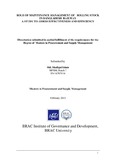Role of maintenance management of rolling stock in Bangladesh Railway : a study to assess effectiveness and efficiency

View/Open
Date
2015-02Publisher
BRAC UniversityAuthor
Islam, Md. ShafiqulMetadata
Show full item recordAbstract
There is no denying to the fact that the safety and reliability of railway transportation system largely depends on efficient maintenance of rolling stock or whatsoever. Such goal needs a scientific and efficient maintenance management. Bangladesh Railway owns a big fleet of rolling stock, sophisticated and conventional and a vast organization is at work round the clock to look after them for optimum utility and efficient service for its users, for this reason proper maintenance is necessary. The main objective of this study is to identify the efficiency and effectiveness of maintenance management of rolling stock and its impact on railway operation. The investigation particularly included determining the existing performance of maintenance and productivity of the management which is related to the rolling stock maintenance and also the scope of maintenance management enrichment. Mainly Data was collected from secondary sources from various monthly reports prepared by mechanical and stores department, statistical Information Book 2013 of Bangladesh Railway etc. Text books, Reference books, published journals, articles, Carriage & Wagon manual, loco shed manual, Workshop manual are studied. Primary data are collected by interviewing employees, shop and depot in-charges, from the seniors, retired and knowledgeable persons and railway officials who are conversant with the maintenance management of rolling stock Bangladesh Railway. Some primary data collected through observation and from secondary maintenance management for assessing efficiency and effectiveness of maintenance management. BR is a state owned service provider. It provides safe, comfortable and economic transport services to the passengers and thus government is paying Public Service Obligatory (PSO) grant. The losses and declining operational performance is closely related with efficient and effective maintenance management of rolling stock. It is true that the practice of maintenance management in BR is so far from the modern concept of management. The author has tried to assess efficiency and effectiveness of maintenance management and to identify the constraints, weakness, and finally concluding with some VI
recommendations coping up those issues with modern and current practices in maintenance management system. The area of the study covered the effectiveness and efficiency of maintenance management of rolling stock of different workshop and sheds (Pahartali, Chittagong, Dhaka, Parbatipur, Dinajpur, Saidpur) of Bangladesh Railway, which was based on primary and secondary data. After examining and assessing, it was found that existing maintenance management of rolling stock in BR is inefficient and ineffective and the subsequent impact is resulting in a decrease in the earning of BR annually. For a state owned Enterprise, the poor maintenance management can be attributed to the following causes. These are (i) Traditional maintenance system and averaged, under capacity facilities of maintenance, (ii) Inefficient and traditional HRM practice, (iii) Insufficient budget allotment, (iv) Inefficient and ineffective safety management, (v) Want of practice of modern maintenance management. For improvement of these situations, some specific recommendations have been drawn. These are (i) BR should clearly define its vision, objectives and policies and to follow modern concepts, policies & practice of maintenance management, inventory and purchasing management., (ii) BR should reorganize its manpower management with modern concept of HRM, (iii) BR should invest adequate fund for re-engineering its workshops, depots and loco sheds with modern equipment and facilities, (iv) Adequate budget should be allocated for material purchase, (v) BR should adopt the modern concept, tools and technologies in case of all related management including maintenance management.
